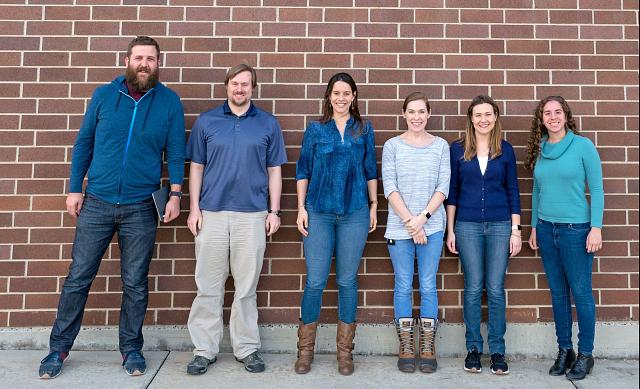
Associated Training Grants
The 3i Initiative has several associate training grants for predoctoral and postdoctoral students. A brief program description and program contacts can be found below.
MPTG trainees (2016-2018): From tallest to less tall – Clayton Carey (PhD student), Andrew Ramstead (postdoc), Ana Beatriz Silva (postdoc), Kyla Ost (postdoc), Sarah Whiteside (PhD student), Erin Larragoite (PhD student)
Programs
Immunology, Inflammation, and Infectious Disease Training Grant
The Immunology, Inflammation and Infectious Disease (III) Training Program seeks to bring together faculty and trainees across the University of Utah Health campus to foster collaborative research in basic and translational immunology. The main component of the III Training Program is individualized research training under the guidance of 30 faculty members in 9 basic and clinical departments across campus. The training program supports 4 pre-doctoral trainees. Pre-doctoral trainees who have completed their qualifying exam are eligible for up to 2 years of support, as selected by the Steering Committee from a large and highly competitive pool of candidates based on prior research excellence, a research proposal and letters of recommendation. Trainees will complete relevant coursework, participate in seminars and retreats, present their research in departmental settings, write a thesis proposal, perform thesis research, publish results and defend their thesis research. In addition, the Training Program will enhance graduate education through the following activities: 1) a one-month clinical immunology rotation at ARUP, the national pathology reference laboratory affiliated with the University of Utah; 2) formal training in grant-writing, leading to submission of an extramural grant proposal; 3) support for travel to present data at scientific meetings; 4) regular lunchtime discussions of research progress with other Training Program trainees and mentors; 5) interaction with invited speakers for the Immunology, Inflammation and Infectious Disease seminar series, as well as coordinating 1-2 student-invited speakers per year; 6) annual presentation of research at the Microbiology and Immunology retreat or Immunology, Inflammation and Infectious Disease Symposium; 7) guidance in the effective utilization of Individual Development Plans (IDPs) and individualized career guidance; and 8) formal mentoring in the use of biostatistics related to immunological research. Given the exceptional training track record of our faculty, available resources to support research and robust institutional support, the III Training Program will provide an ideal platform to train the next generation of human disease-focused immunologists.
For additional information, please see: https://medicine.utah.edu/pathology/microbiology-immunology/iiitg.
Computational Approaches to Diabetes and Metabolism Research
The University of Utah Interdisciplinary Training T32 Program in Computational Approaches to Diabetes and Metabolism Research will cross-train a cadre of predoctoral and postdoctoral trainees in the computational and mathematical sciences and in the biological basis of diabetes and obesity. These bioinformatics scientist trainees will gain the expertise and leadership skills to apply computational and mathematical methods to complex biological questions that will ultimately impact the prevention, treatment, and outcomes of people with diabetes and related metabolic diseases. This training program will consist of a combination of mentored research and career development training, coursework, and extensive interactions with faculty and trainees across campus and beyond.
For additional information, please see: http://medicine.utah.edu/dbmi/academics-education/
Microbial Pathogenesis Training Program
Microbial Pathogenesis lies at the crossroads of Microbiology, Immunology, Infectious Diseases, and Host Defense. The Microbial Pathogenesis Training Program serves as a platform for integrated training of predoctoral and postdoctoral trainees by bringing together basic scientists and clinician scientists for the exchange of ideas and enhancement of research goals and training at the University of Utah.
The Microbial Pathogenesis Training Program University of Utah supports three pre-doctoral and three post-doctoral trainees for a minimum of one year. The program faculty for this training program consists of 33 senior scientists drawn from a range of disciplines.
Key components of the Training Program include many opportunities for exposure of the trainees and the broader community to cutting-edge research and interactions including the Microbial Pathogenesis Seminar Series, the Microbial Pathogenesis Retreat, the Summer Journal Club, the Clinical-Microbiology Combined Conference, and advanced courses in Bacterial Pathogenesis, Viral Pathogenesis, and Immunology. Critical to the training environment are trainee opportunities for interaction with Microbial Pathogenesis Seminar Series, speakers with a variety of research and health perspectives, and the opportunity to host distinguished speakers. Each of the trainees also present their research at the Training Grant Retreat, providing them with an opportunity for exposure to the greater microbial pathogenesis community on campus and to receive feedback from the external scientists
For additional information, please see: https://medicine.utah.edu/pathology/microbiology-immunology/mptg
Multidisciplinary Pulmonary & Critical Care Research Training Program
Information coming soon.
National Library of Medicine (NLM) Training Program
The NLM Training Grant will train pre- and postdoctoral fellows. The grant focuses on four general areas of focus: 1) Clinical Informatics; 2) Clinical Research Informatics; 3) Population and Public Health Informatics; and 4) Bioinformatics and Statistical Genetics. Woven through these areas of focus are three strong methodology lines: 1) sociotechnical design and evaluation, 2) biomedical natural language processing, and 3) data analytic and decision support. This level of integration greatly enhances the power and rigor of the curriculum. The aims of our training program are: 1) To provide a rigorous and integrated curriculum giving students the necessary foundation for an effective research career in biomedical informatics. 2) To ensure students have strong foundations in the conduct of ethical, rigorous, and responsible research. 3) To provide a comprehensive research environment with the broadest possible variety of resources for faculty and students to encourage creative and innovative research. Our trainee research environment is unparalleled. We provide access to clinical, public health, data science, and translational clinical research opportunities. Utah has a superb computational infrastructure as well as one of the largest network healthcare settings in the nation, including a major academic medical center; a statewide nonprofit healthcare network; and a regional Veterans Administration Medical Center. All three are national leaders in informatics.
For additional information, please see: https://medicine.utah.edu/dbmi/academics-education/grants
